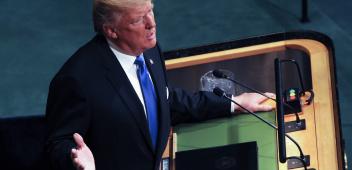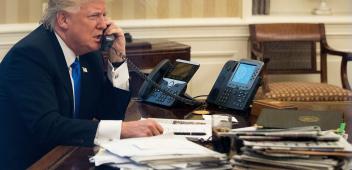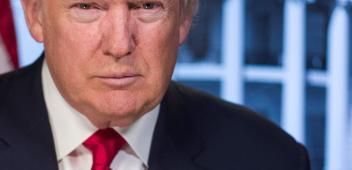'It's going to be a bumpy ride'
'The US-led world order is tipping further into decline.'
Originally published in The Australian. Photo: Getty Images/Gary Hershorn

As the Trump juggernaut rolled across the US on election day, turning the political map red, anxious foreign leaders began to contemplate a new world order of a kind few had envisaged.
Could it be that Donald Trump, the quintessential change agent, would administer the last rites to Pax Americana, the US-led rules-based Western order that had prevailed since 1945, thereby achieving what China, Russia and legions of anti-American jihadists had failed to bring about?
German Defence Minister Ursula von der Leyen believes Donald Trump’s shock win signals the end of Pax Americana. Many others agree, among them former Australian foreign minister Bob Carr, who sees the failure of Barack Obama’s signature Trans-Pacific Partnership as 'symbolic of the dismantling of the post-World War II order in which the US had sought a global leadership role'.
In one sense, Leyen and Carr are right. Pax Americana, as we have known it, is dead and about to be buried by Trump. There is bitter irony in a new US president happily dispensing with an international order that his 12 post-World War II predecessors spent their presidencies building and protecting. But Trump is not responsible for its denouement, just as an undertaker bears no responsibility for the deaths of the cadavers in his care. Trump’s skill has been to identify and ride the crashing wave of systemic discontent surging across the US and the wider geopolitical landscape set in motion by pent-up structural, technological and political forces.
The last time this happened the Soviet empire collapsed, bringing the Cold War era to an abrupt end. However, although Pax Americana has passed into history, the US is not about to disintegrate internally as its enemies hope. Regardless of the success or failure of the Trump revolution, the US will prosper because of its resilience and underlying strengths.
What is even more certain is that Trump will catalyse and preside over a far bigger shift in the international system than occurred after 1989, and its repercussions are likely to be long felt.
System change is an enduring feature of human history as civilisations, empires and great powers rise and fall. Modern technology seems to be speeding up the process, reducing the time between geopolitical and economic super cycles. When such shifts take place, they are usually accompanied by high levels of political, economic and social volatility, leading in turn to increased conflict, disruption and major redistributions of power and wealth. The interregnums between a failing old system and a nascent new order typically last for a decade or more.
All the signs suggest we are entering a transitional era and the signs are there will be a lengthy period of turbulence.
To locate the turning point, we need to go back to the presidency of George W. Bush.
In 2003, at the height of his power, Bush made the egregious strategic error of removing Iraqi dictator Saddam Hussein in the mistaken belief that Saddam’s fall would herald a democratisation of the Middle East and prove, beyond doubt, the exceptionalism of US power and virtue.
A senior official in the Bush administration, widely believed to be Karl Rove, Bush’s deputy chief of staff, captured the hubris of the moment when he proclaimed to a journalist: 'We’re an empire now, and when we act, we create our own reality. We’re history’s actors … and you, all of you, will be left to just study what we do.'
Unfortunately for his country, the Bush 'reality' was injurious to US interests, resulting in two drawn-out wars that sapped the morale of the military and weakened Pax Americana economically before a second shock arrived in the form of the worst financial crisis to hit the US since the Depression. Although the US under Barack Obama remained the most powerful nation, it no longer had the resources or resolve to play global cop in a more complex and dangerous world that included yet more Middle Eastern conflicts, a full-blown Islamist insurgency and multiple challenges from a rising China and resurgent Russia.
The same forces that brought Trump to power in the US — economic malaise, rising protectionist sentiment, unregulated migration pressures, a breakdown in social cohesion and political polarisation — also have afflicted other democracies, giving authoritarian competitors, and adversaries, unexpected opportunities to configure the emerging world order. Russia in Europe, Iran in the troubled Middle East and China in Asia have been the chief beneficiaries, along with emboldened, serial troublemakers such as North Korea and Islamic State.
European governments failed to heed the warning signs, ignoring their own disenfranchised communities, opening their borders to a wave of uncontrolled migration and neglecting their defences against terrorism and more conventional security threats in a naive and complacent disregard for their own national security.
Brexit undermined not only the European project but also Pax Americana. Even if there are no further defections, the sharp drift to the Right and the weakening of European cohesion and weight in the world is likely to be confirmed in important European political contests across the next 12 months, which could see political parties sympathetic to Trump’s agenda seize power or become more influential in France, Austria, Italy, The Netherlands and Germany.
If these are the reasons for the passing of Pax Americana, how is the new international order likely to evolve and what role will Trump play? Some of its defining features are readily identifiable.
Already, the unipolar world of Bush has been superseded by a multipolar arrangement in which there is no longer a hegemonic 'hyper-state' but a core group of relatively powerful countries with different values and interests jostling for position in the post-American world. Aside from the US and a diminished Europe, they include China, Russia, Japan, India and a lower tier of smaller but regionally influential states, of which Iran, Saudi Arabia, Turkey, Indonesia, South Africa and Brazil are the most significant.
A second distinguishing feature is the emergence of disruptive non-state entities that operate as independent agencies with their own agendas and sometimes state-like capabilities. Al-Qa’ida, Islamic State, people-smugglers and other transnational criminal groups are representative.
However, it would be erroneous to conclude that the US is a busted flush or Western democracies are facing the end of their history. It’s conceivable that Trump will succeed in rejuvenating the US economy.
Even if he doesn’t, the US isn’t going into terminal decline and no other country has the means or desire to assume its mantle. Nonetheless, future global leadership will be much more of a collective affair, with greater scope for confrontation, obstructionism and disagreement.
As the self-proclaimed master of the deal, Trump could well prosper in this environment, particularly if he can unlock the enormous residual US strengths that have been obscured by Washington’s gridlocked political system and Obama’s natural caution.
With Republicans in control of congress and holding a majority of state governorships, Trump won’t be shackled like Obama. He has a once-in-a-generation opportunity to make good on his pledge to change America, for change is clearly required.
Yet Trump’s promised revolution may not be quite as revolutionary as his critics fear or his supporters hope. To understand why, it is important to grasp that Trump is not a traditional isolationist. He cannot make America great again by disengaging from the world. He will be shaped by international events and the realities of the post-American world as much as he shapes them.
Both his persona and public comments suggest that he will be more of a pragmatic realist than a neo-isolationist, with perhaps a touch of the 'crazy gene' that former prime minister Paul Keating believes all leaders must possess if they are to make a difference.
Trump certainly won’t be a liberal internationalist such as Obama, so human rights, the UN and multilateralism will be de-emphasised in his administration’s foreign policy.
He won’t be driven by neoconservative impulses either, in the manner of his Republican predecessor, Bush. Trump is not interested in democratising the world or high-risk interventionism.
But it would be folly to believe that he won’t prosecute US interests internationally with vigour, commitment and single-mindedness. In an age of political strong men, the US now has its own. And Trump likes to win.
Moreover, as he settles into office, he will become more aware of the complexities of international relations and how the US benefits from its alliance system and international trade. It’s a misreading of his public comments to believe Trump is going to trash NATO, ANZUS or the Asian alliance. What he wants is his allies to pay their way. He has every reason to expect this from those allies who have fallen below agreed benchmarks for defence spending and are too reliant on the US for their security.
Conventional wisdom holds that the big winners from Trump’s election will be Russia and China, America’s main competitors for global influence.
Trump’s criticism of NATO as obsolete has been music to the ears of Russian President Vladimir Putin, which is one reason Putin is pulling out all stops to reset Russia-US relations.
Chinese President Xi Jinping undoubtedly is relieved that the hawkish Hillary Clinton has been defeated, promising him a freer hand to assert China’s interests in East Asia when the Association of Southeast Asian Nations is fractured, and former US friends and allies such as The Philippines, Thailand and Malaysia are all showing signs of drifting into the pro-China camp.
But if Putin and Xi are tempted to pull out their best vodka and maotai for a celebratory drink, they may want to leave the bottles in the cabinet because the Trump ascendancy could pose a more formidable challenge to their countries than a Clinton presidency.
Honeymoons are usually short-lived in international affairs. At some stage, making the US great again is going to bring Trump into conflict with the equally assertive Putin and Xi over trade and currency issues or geopolitical differences.
Of the two, Xi has more to worry about. Trump already has branded China a currency manipulator. If he aggressively prosecutes his protectionist agenda then the two things China needs most — stability and open markets — will be jeopardised. Even if he doesn’t, Trump will be more difficult to read, opportunistic and prepared to rock the boat to get what he wants. His mercurial nature will be disconcerting for the Chinese, who value predictability.
Xi’s deeper concern is that Trump may try to decouple Russia from China in much the same way as Xi has driven a wedge between the US and some of its longstanding allies in Asia. If Trump were to offer Putin a deal that accepts Russia’s annexation of Crimea and a de facto buffer zone in eastern Ukraine to preclude further NATO enlargement, then Putin would be under pressure to make reciprocal concessions that might include a less intimate and supportive strategic relationship with China.
However, what will most concern Xi is Trump’s apparent indifference to the possibility of Japan and South Korea developing their own nuclear weapons and his promise to rebuild an ageing US military machine, giving him a much bigger stick with which to defend US interests abroad.
Much of the touted new defence investment, totalling as much as $US500 billion during the next decade, will be directed towards the navy, with the number of ships slated to increase from 274 to 350, arresting a long-term decline in US naval strength. Across time, this will enable the US to fight a two-ocean war and decisively shift the naval balance of power in the Pacific away from China to the US, unless Xi is prepared to match the US build-up.
Trump’s election poses risks and opportunities of a different nature for Australia, testing our strategy, diplomacy and ingenuity.
Among the risks is reduced popular support for the US alliance should Trump’s America be perceived as moving too far to the Right or as being out of step with mainstream Australian values.
This is a real possibility in the light of calls from opposition foreign affairs spokeswoman Penny Wong and Labor luminaries such as Paul Keating for a rethink of the US alliance. A Trump-initiated trade war with China or US disengagement from the region would be especially detrimental to our interests.
But Australia is better placed than most to navigate the shoals ahead.
We are likelier than not to find favour with a Trump administration because of the enormous amount of political capital invested in the US relationship by generations of Coalition and Labor politicians, and the enduring strength of economic and personal ties.
The best way of ensuring that the turbulent transitional period between the old and emerging systems is peaceful is to use the leverage at our disposal to reinforce the co-operative instincts of the most influential players.
This must include Trump because, although Pax Americana is no more, the US will be first among equals in the new world order.



